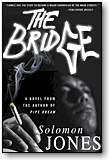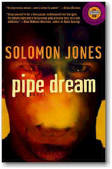Solomon Jones - Chat Transcript - July 17th 2003
Solomon Jones, the author of Pipe Dreams comes a new novel about Detective Kevin Lynch who returns to his childhood home—The Bridge—to investigate the disappearance of a ten-year-old girl
 The
Bridge
The
Bridge
Click to order via
Amazon
or
Barnes and Noble
by Solomon Jones
Format: Hardcover, 320 pages
ISBN: 0-312-30615-6
Publisher: St. Martin’s Minotaur
Publication Date: June 3, 2003
 Solomon Jone = Solomon Jones
Solomon Jone = Solomon Jones
Thumper:
LOGGED IN
~ July 17,
Thursday 8:43:48 p.m. ~
Solomon Jone:
LOGGED IN
~ July 17,
Thursday 8:58:47 p.m. ~
Solomon Jone:
Yo
Thump - wassup?
~ July 17,
Thursday 8:59:12 p.m. ~
Thumper:
![]() Hello Solomon, how are you
this evening?
Hello Solomon, how are you
this evening?
~ July 17,
Thursday 8:59:13 p.m. ~
Solomon Jone:
I'm
great. Sorry I'm late. I'm organizing a church festival for Saturday and if I
had hair I'd be pulling it out.
~ July 17,
Thursday 8:59:47 p.m. ~
Thumper:
![]() You're not that late. I'm
glad you could spend a few minutes with me.
You're not that late. I'm
glad you could spend a few minutes with me.
~ July 17,
Thursday 9:00:30 p.m. ~
Thumper:
![]() A few months ago I read your
new novel, The Bridge, and loved it. How did the book and the idea for the book
come about?
A few months ago I read your
new novel, The Bridge, and loved it. How did the book and the idea for the book
come about?
~ July 17,
Thursday 9:02:02 p.m. ~
Solomon Jone:
I
wrote a story for the Philadelphia Weekly about a little girl who'd gone missing
in a housing project in Philadelphia. She was murdered, adn the culprit has
never been found. It was and is the type of story that deeply affected everyone
involved. While The Bridge is not a retelling of that story, it was certainly
inspired by it.
~ July 17,
Thursday 9:04:16 p.m. ~
Thumper:
![]() I'm sure you are asked this
question a lot, or will soon be asked, did you grow up or live in a housing
project like The Bridge?
I'm sure you are asked this
question a lot, or will soon be asked, did you grow up or live in a housing
project like The Bridge?
~ July 17,
Thursday 9:05:28 p.m. ~
Solomon Jone:
No,
I didn't. But, interestingly enough, the reviewer for Publisher's Weekly writes
at the end of the review, "Jones, who grew up in the projects and knows his
subject well, is a talent to watch." Don't know where they got that particular
peice of erroneous information, but I think that is a high compliment. It says
something about the authenticity of the work.
~ July 17,
Thursday 9:07:48 p.m. ~
Thumper:
![]() I agree. You brought The
Bridge to life for me.
I agree. You brought The
Bridge to life for me.
~ July 17,
Thursday 9:08:41 p.m. ~
Thumper:
![]() I suspect being a journalist
is different from being a novelist. How do you wear both hats at the same time?
Does it get confusing at times?
I suspect being a journalist
is different from being a novelist. How do you wear both hats at the same time?
Does it get confusing at times?
~ July 17,
Thursday 9:10:51 p.m. ~
Solomon Jone:
Thank you. The thing I'd always noticed about the housing projects I've visited
- and I've visited a few - is their closed-in nature. It's almost like it's a
world unto itself. There is a certain darkness. But at the same time, there is
this determination and grit that really bubbles over from the people there. Some
of them are determined to make it out. And some are determined to stay where
they are. But that is the case is most societies. Not just housing projects.
~ July 17,
Thursday 9:11:00 p.m. ~
Solomon Jone:
Not
now. I'm currently writing a column called Keeping Up With The Jones. It's a
departure from my work in hard news and in-depth features. Basically, I write
funny stories about my wife and kids. For example, my wife bought some cheap
sneakers. I wrote about that. The types of stories that are very light-hearted.
Really the antithesis of my work as a novelist.
~ July 17,
Thursday 9:13:24 p.m. ~
Thumper:
![]() Solomon, you accomplished a
feat that not many authors have, you created a child character that was cutesy-wutesy
with Kenya. Kenya had problems. Did you set out for Kenya to emerge this way or
did it just happen?
Solomon, you accomplished a
feat that not many authors have, you created a child character that was cutesy-wutesy
with Kenya. Kenya had problems. Did you set out for Kenya to emerge this way or
did it just happen?
~ July 17,
Thursday 9:15:47 p.m. ~
Thumper:
![]() I meant -- child character
that was NOT cutesy-wutesy
I meant -- child character
that was NOT cutesy-wutesy
~ July 17,
Thursday 9:16:24 p.m. ~
Thumper:
![]() It seems here lately authors
are intent on giving us the black version of Leave it to Beaver. I don't get it.
It seems here lately authors
are intent on giving us the black version of Leave it to Beaver. I don't get it.
~ July 17,
Thursday 9:17:20 p.m. ~
Solomon Jone:
I
think it just happened. What I notice about children in the 'hood is that they
are very intelligent, and keenly aware of their surroundings. They know who's
selling, who's using, who's tricking, who's crooked and who's straight. So I
tried to breathe that intelligence and sensitivity into Kenya, while at the same
time allowing her to be a little girl . . . On the Leave It To Beaver thing, I
think some of us believe that's what readers want. I've had readers complain to
me that they don't want to read about the 'hood. They know all about the 'hood.
And then I challenge them to read my work, adn they realize that a story
wellltold can be set anywhere, at any time, in any circumstance, adn still
reveal the frailty and the strength of humanity.
~ July 17,
Thursday 9:19:16 p.m. ~
Thumper:
![]() Speaking of which, I was
going to ask you how you felt about the new wave of Urban-ghetto books that have
appear to have captured the media's attention. Would you put your book in the
same category as Gangsta or Triple Take?
Speaking of which, I was
going to ask you how you felt about the new wave of Urban-ghetto books that have
appear to have captured the media's attention. Would you put your book in the
same category as Gangsta or Triple Take?
~ July 17,
Thursday 9:21:43 p.m. ~
Solomon Jone:
I
don't think so. I read the first few pages of Triple Take and was impressed with
the writing. I haven't read Gangsta and can't speak on it. But I would hope that
my storytelling compares favorably with a wide-range of writers. Not just urban
writers, but mainstream writers as well. I work hard at my craft, I've been
fortunate to have good editors, and I love the support I get from my base, my
bread and butta - black readers. I love y'all! But it is so satisfying when
little old white ladies come to my signings and say they loved Pipe Dream.
Because when they do, it means several things. It means I've written about the
hood in such a way that anyone can read and enjoy it. It's not profanity-laced.
It's not x-rated. But it is intense and unflinchingly real. The other thing that
it means is that our ancestors have emerged victorious. Not only have their
children learned to read and write, despite every effort to keep us from doing
so. But we've learned to read and write so well that white folks pay money to
read our work. That's victory, Thump. That's victory!
~ July 17,
Thursday 9:28:28 p.m. ~
Thumper:
![]() Most definitely!! I agree.
Most definitely!! I agree.
~ July 17,
Thursday 9:31:24 p.m. ~
Thumper:
![]() You bring up your first book
Pipe Dreams. I could tell a difference in your writing from the first book to
The Bridge. I hate to say the word mature, but your style seem to have ripen.
That blew me away.
You bring up your first book
Pipe Dreams. I could tell a difference in your writing from the first book to
The Bridge. I hate to say the word mature, but your style seem to have ripen.
That blew me away.
~ July 17,
Thursday 9:33:08 p.m. ~
Thumper:
![]() I wasn't expecting it. I
don't know why, but I wasn't. Do you feel that you've grown as writer? Have you
found your voice?
I wasn't expecting it. I
don't know why, but I wasn't. Do you feel that you've grown as writer? Have you
found your voice?
~ July 17,
Thursday 9:34:35 p.m. ~
Solomon Jone:
Thanks a lot. I definitely learned a lot between the first book and the second.
It was really just a matter of relaxing, settling back, and allowing the gift
that the Creator gave me to flow. I also had a good editor who did not change
anything. Not that my first editor changed anything. She didn't. But Monique
Patterson is great because her input enhanced the work. She asked the right
questions in all the right places and helped me to really put that little extra
into the work . . . On maturing, I feel that I am maturing as a man. I've seen
and experienced things that I had not experienced when I wrote Pipe Dream. I
think that shows not only in my writing, but in my life.
~ July 17,
Thursday 9:38:25 p.m. ~
Thumper:
![]() That's good. I'm glad to
hear it.
That's good. I'm glad to
hear it.
~ July 17,
Thursday 9:39:38 p.m. ~
Solomon Jone:
One
thing that's really challenging for me is being a husband and father - a
provider. If that don't make you grow up, nothin' will . . .
~ July 17,
Thursday 9:40:28 p.m. ~
Solomon Jone:
But
I am so glad that God gave me the opportunity to havbe a family to care for. It
is truly a great gift, and I appreciate it.
~ July 17,
Thursday 9:41:06 p.m. ~
Thumper:
![]() I gotta ask one more
question. I know I'm over the 30 minutes time limit. Is it becoming easier
juggling home, career?
I gotta ask one more
question. I know I'm over the 30 minutes time limit. Is it becoming easier
juggling home, career?
~ July 17,
Thursday 9:41:32 p.m. ~
Solomon Jone:
It's challenging. What I'm really hoping is that someone will buy the screenplay
for Pipe Dream so I can spend more time doing the things I enjoy most - loving
my family and writing
~ July 17,
Thursday 9:43:20 p.m. ~
Thumper:
![]() I can't see why Hollywood
hasn't beaten down your door yet. Both of your books unfolded like movies
playing in my head. They can actually film it directly from the books.
I can't see why Hollywood
hasn't beaten down your door yet. Both of your books unfolded like movies
playing in my head. They can actually film it directly from the books.
~ July 17,
Thursday 9:45:45 p.m. ~
Thumper:
![]() Thanks for chatting with me
Solomon. Do you have any parting words you would like to tell the people?
Thanks for chatting with me
Solomon. Do you have any parting words you would like to tell the people?
~ July 17,
Thursday 9:47:32 p.m. ~
Solomon Jone:
Thump, I need you to put a call into Holywood and tell them that . . . But
seriously, there has been some interest. But someone really has to commit to the
project and put some money on the table.
~ July 17,
Thursday 9:47:39 p.m. ~
Thumper:
![]() Man, that's not a problem,
email me a phone number or somethin'.
Man, that's not a problem,
email me a phone number or somethin'.
~ July 17,
Thursday 9:48:24 p.m. ~
Solomon Jone:
I
just want to reiterate how grateful I am to you and all my readers for following
my work, for enjoying it, adn for giving me the opportunity to share it with
you. You are the reason I do what I do. Thank you, thank you, thank you.
~ July 17,
Thursday 9:48:53 p.m. ~
Thumper:
![]() Thank you. It's been a
pleasure reading your books and chatting with you. Maybe one day we'll do it in
person. *smile*
Thank you. It's been a
pleasure reading your books and chatting with you. Maybe one day we'll do it in
person. *smile*
~ July 17,
Thursday 9:49:58 p.m. ~
Solomon Jone:
Take care, Thumper.
~ July 17,
Thursday 9:50:30 p.m. ~
Thumper:
![]() Good night.
Good night.
~ July 17,
Thursday 9:50:42 p.m. ~
Thumper:
![]() You too Solomon.
You too Solomon.
~ July 17,
Thursday 9:50:56 p.m. ~
Thumper:
LOGGED OUT
~ July 17,
Thursday 9:51:03 p.m. ~
Solomon Jone:
LOGGED OUT
~ July 17,
Thursday 9:51:05 p.m. ~
Related Links
Solomon Jones
Official Web Site
http://www.solomonjones.com
The Bridge - AALBC.com Review
http://aalbc.com/reviews/the_bridge.htm

Pipe
Dream
Click to order via Amazon or Barnes and Noble
by Solomon Jones
Format: Paperback, 256pp.
ISBN: 0375756604
Publisher: Random House, Incorporated
Pub. Date: July 24th 2001
Pipe Dream was chosen for the CWMYB Online Book Club's Reading list (Reading List October 2001)
